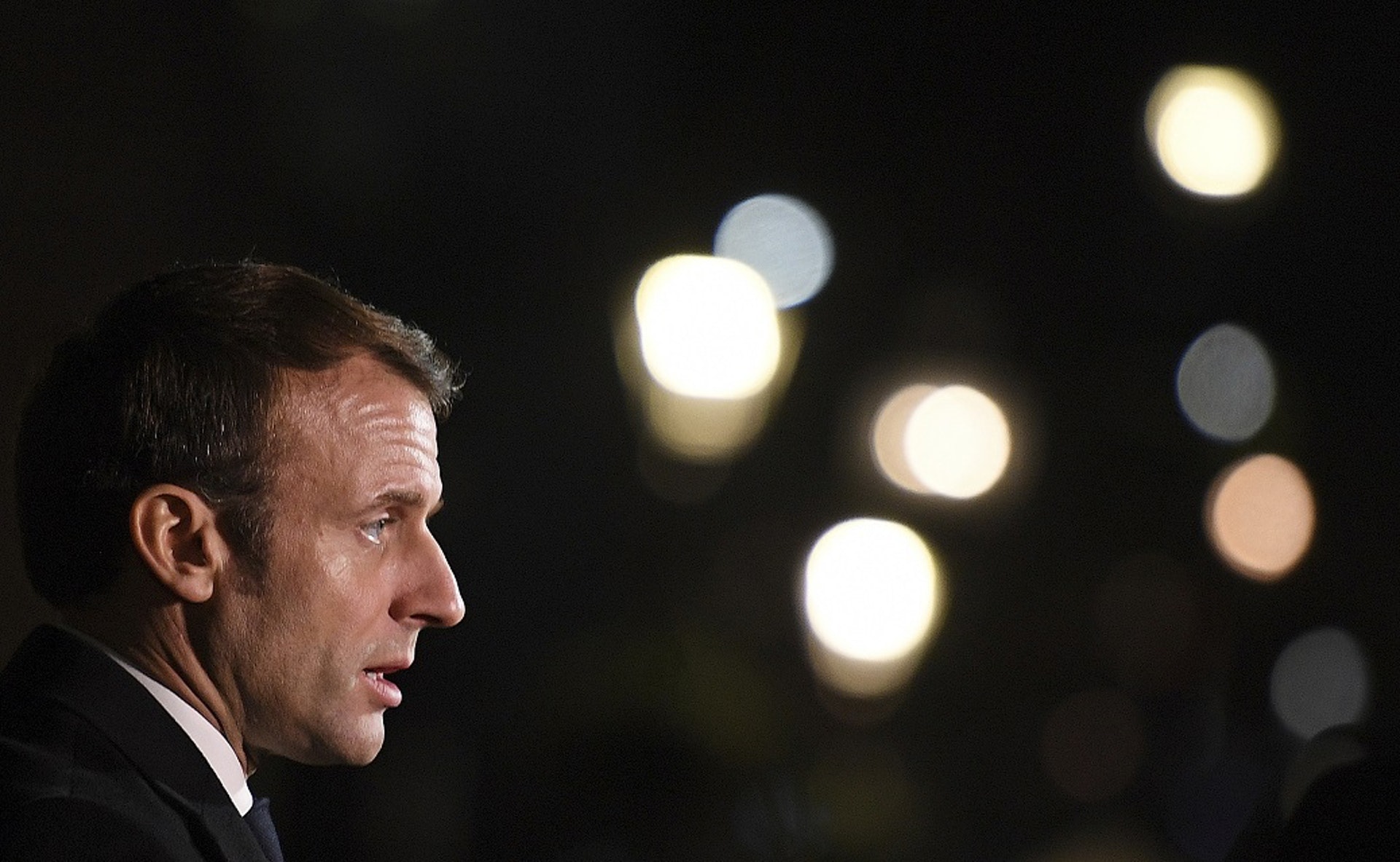The annual meeting of the North Atlantic Treaty Organization (NATO) will be held in London, UK on December 3 and 4. However, like the G7 summit, where internal conflicts are intensifying, the atmosphere of the NATO summit is not harmonious. Some people use ridiculous metaphors, “France is dissatisfied with the United States and Turkey, Germany is dissatisfied with France, Trump is dissatisfied with France but not with NATO people, and NATO people are dissatisfied with Trump.” It also shows the differences within NATO quite vividly.
These differences are long overdue, but at least the parties have also worked hard to maintain political correctness and maintain organizational harmony. The person who tore up this layer of harmonious appearance and made it difficult to hide various differences at the summit was French President Emmanuel Macron and his recent statement that “NATO has been brain dead.”
Macron’s “Wanderlaughter”
In an exclusive interview with The Economist at the end of October, Macron spoke the most radical words in the calmest tone: NATO was originally established in response to the Warsaw Pact, but now with the disintegration of the Soviet Union, NATO is already Becoming a transatlantic relationship that “the United States provides security for Europe and Europe buys American goods to compensate”, at least the Americans represented by Trump view NATO like this. Macron went on to say that France is not a member of NATO for this kind of cooperative relationship. “NATO is brain dead. On the one hand, the United States makes strategic decisions alone without coordinating with its allies. On the other hand, Turkey launches offensive operations on its own … We can effectively command military operations, but in the strategic and political dimensions, we must recognize the problems at hand. “
Since the interview was published on November 7, “NATO brain death” has become the core word of focus of all parties and has caused word of mouth in the past month for many politicians-taking German Chancellor Angela Merkel as an example She first criticized and disagreed immediately after Macron’s speech was published, and then talked about the significance of NATO in the general debate speech of the German Federal Parliament on November 27, saying that Europe cannot defend itself by itself, Germany is right to assume more responsibility for NATO.
However, according to US political media Politico, “Many EU officials privately believe Macron’s complaint is probably correct.” In fact, many small European countries joined NATO in order to obtain military security guarantees. In recent years, the NATO summit has always been tangled with military spending and other issues, and lacked coordination in the strategic decision-making dimension.
However, regardless of differences of opinion or concerns about the United States, NATO member states have chosen a smoother wording. Only Macron, who is known for his arrogance, once again showed his arrogance. It’s weird that people aren’t surprised by this-if anyone in Europe is most likely to stand up and say that this is “missing”, it can only be France.
Looking back at the source of all these disputes, in an interview with The Economist at the end of October, Macron talked with reporters in the magnificent Elysee Palace for more than an hour. Talking about the integration of the political model and the European Union (EU), “NATO brain death” is definitely not the focus. From this interview, one can clearly see his consideration of the current situation in the horizontal direction and the prospects in the vertical direction. Throughout this article, it is his pursuit of independence in France and even Europe.
This is not new to France, after all, since Charles de Gaulle fifty years ago, the presidents of the Fifth French Republic have maintained the same independent and independent thinking.
Stubborn de Gaulle’s steadfast successor
W. Averell Harriman, the childhood playmate of US President Franklin D. Roosevelt and successively the ambassador to the United Kingdom and the Soviet Union, was respectfully received wherever he went. In the UK, he chatted with Winston Churchill in a country house; in the Soviet Union, he talked with Joseph Stalin in the Kremlin. However, according to Harriman’s memoirs, he used to fly with Charles de Gaulle, and Charles de Gaulle ignored his love, and they could not talk for three hours in a few hours-Charles de Gaulle was such an arrogant person His character also makes his career in politics more difficult.
In 1944, Charles de Gaulle, who returned to Paris, thought that he could lead France to rejuvenation. However, he was quickly pushed out by experienced politicians in the Fourth Republic because of his lack of political struggle. It was twelve years. By 1958, the Fourth Republic suffered a fiasco defeat in the Battle of Dien Bien Phu in Vietnam, and the Suez War in the Middle East failed sloppily. Algeria also began an independent movement, and politicians in the country were addicted to the struggle for power. In this case, Charles de Gaulle seized this opportunity to resurrect and reinvent the French political system from the beginning.
Charles de Gaulle also reshaped French diplomacy. In 1946, the U.S. Congress passed the Atomic Energy Act, marking the establishment of the United States nuclear monopoly policy, which made the United Kingdom and Canada directly involved in the development of U.S. nuclear weapons, and made Charles de Gaulle “look in your mind, keep in mind”, Accelerate the development of independent nuclear weapons and eventually succeed in the atomic bomb explosion in 1960; in 1964, Charles de Gaulle again under the pressure of the United States and became the first Western power to establish diplomatic relations with the People’s Republic of China; in 1966, in view of the Vietnam War The United States, which competed with the United States and the Soviet Union, withdrew from the NATO command structure on the ground that “France must not give the defense it depends on to foreign protectors because foreign countries are ultimately unreliable,” and retained only the right to participate. As a result, France is still the only member of NATO that is not in the “nuclear planning team”. Its nuclear policy is completely independent of NATO, and it also has a rare independent and sound military industry in the EU.
To a large extent, Charles de Gaulle’s foreign policy has also been continued by its successors.
Facing the United States, which ca n’t wait to ease US-French relations, former French President Georges Pompidou co-operated while maintaining military and diplomatic independence. In September 1973, he became the first person to visit China as a cancer patient. Incumbent Head of State of Western Europe. Another former French President, Giscard d’Estaing, supported his “European Union” throughout his life, co-chaired the drafting of the “EU Constitution Treaty” with the Prime Minister of West Germany, and advocated the establishment of the European Monetary Union for the euro. Foundation. From 1981 to 1995, French President Francois Mitterrand has consistently emphasized the independence of France and Europe on national defense, nuclear weapons, relations with Africa, European integration, and relations with Britain and the United States. Regardless of US lobbying, China’s policy signed the “China-France Joint Gazette” with China in 1993 to end French arms sales to Taiwan. French President Jacques Chirac, who was in power at the turn of the century, insisted on the French-German alliance, struggling for a place for France and Europe during the post-cold-war period of the United States. Anti-war horn.
In the Macron era, in his September 2017 EU vision speech, he bluntly stated that “the current challenge is life and death, and the seawall that once protected Europe’s prosperity has been submerged. We can only move along the only path: rebuilding independence, unity and The foundations of democracy in Europe. ” To this vision, Macron proposed the establishment of the “European Army” in 2020, the establishment of a unified finance minister and budget, and further overall planning on many issues such as environmental protection and immigration. Although these visions and initiatives are difficult to implement, they reflect Macron’s unwillingness to “behind the fence” and pursue the French and Europeans’ own “ownership” obsession.
This arrogance and dedication to independence is a characteristic that has been inherited from the past French presidents.
Philosopher’s anxiety
From an outsider’s perspective, the French always give the impression of “arrogance”. In fact, the French themselves do not deny this, after all, they do have arrogant capital. France is the oldest country in Europe that has not experienced a cultural fault. Its culture and language have a profound impact on Western culture. French has been the universal language of the Western world for more than 200 years before the First World War. France. Leaving aside these cultural capitals, the rigorous education system and fierce social competition in contemporary France have strengthened the pride of “the survival of the strong”.
Perhaps it is this mentality of “tolerating himself that is inferior to others”, which led Macron to the Economist with the concern that “the EU may disappear from the geopolitical level.”
He was worried that the EU ’s “North-South divergence” due to economic conditions and “East-West divide” due to immigration issues. These two issues have made EU countries more difficult to govern, resulting in difficulties in electing cabinets and the minority government ’s governance. Become common. And when Macron remembered these EU crises, and then re-associated with the trend of international geography being increasingly shifted to “China-US G2”, he even worried him about the decline of EU competitiveness. “If we don’t do something about these crises, The EU will most likely disappear from the geopolitical level, or at least no longer be able to control its own destiny. “
Because of this philosophical reflection, Macron repeatedly claimed that “we are experiencing the end of Western hegemony”, emphasized the “autonomous strategy”, pushed for the integration of the European Union, and even independent of the United States foreign policy, and tried to improve the relationship with Russia To deepen cooperation with China.
Many people would say, “France is still dreaming of an unrealistic dream of the great power of the past”, but behind this deep obsession, it may be a kind of panic. The panic is not “I am the shadow of the past”, but “Today I ’m far from reaching my potential. ” This is not only reflected in the arrogant attitude that the French usually show, but also in Macron’s anxiety, and his previous predecessors’ dedication to France and even Europe.












